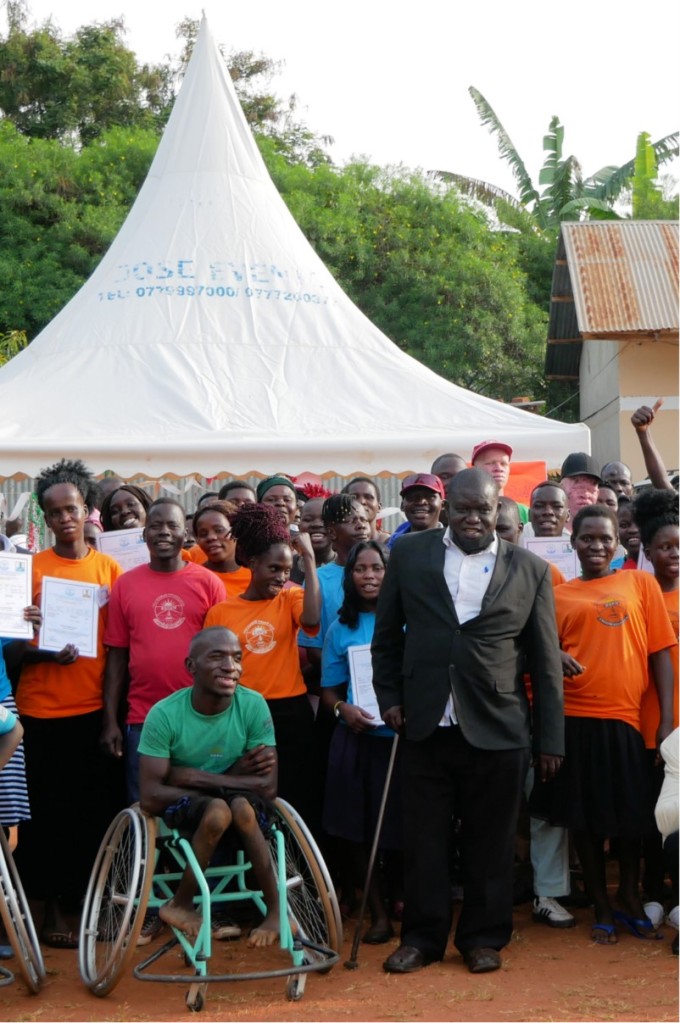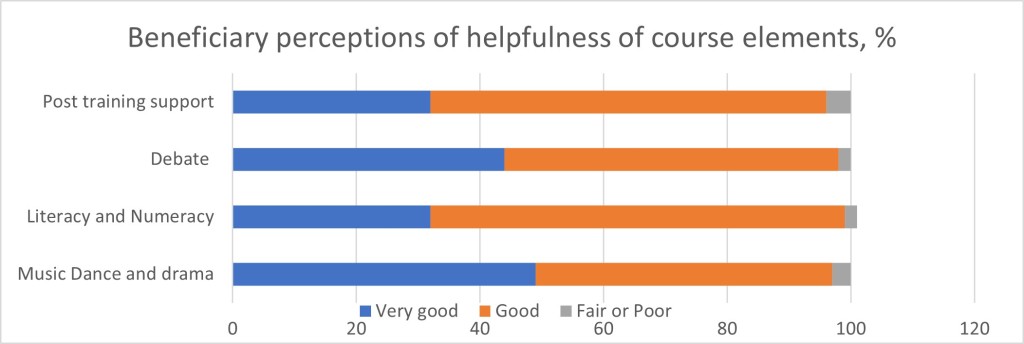Enhancing the capacity of young persons with disability through vocational and literacy education and training
A project based in Gulu, Northern Uganda supported by UK Aid Direct’s Small Charities Challenge Fund and Enhancing the Capacity of Persons with Disability

Summary of the Final Evaluation of Vplus
Vplus: Many successes, many lessons and more to do…
“Before enrolling for the skills training in 2022, I was not valued in my family because of my medical condition, I dropped out of school because no one bothered to keep me in school. I was seen as marriage material at a very young age,
The VPlus project changed everything. It was a miracle. I can say I learnt new employable skills in hairdressing, I identified my talent and potential through music, dance and drama.”
Adoch Fiona, VPlus Graduate
VPlus, a training and employment support project in Northern Uganda that ran from 2021 to 2023, has transformed the lives of 115 young people with disabilities by providing them vocational training, literacy and numeracy skills, self-esteem and confidence building and post-training support. These young people are now developing their own businesses or employment so they can make a living. Before they attended the six-month long training course, they had received little or no education and, often, their families and communities had written them off as not able to achieve anything outside the home.
The VPlus graduates had a choice of the following skills: sweater knitting, tailoring, hairdressing, design and decoration, motor vehicle repair and maintenance and electronics. Two 6-month long courses were organised over the two years for two cohorts of trainees together with continued support for graduates after the training centre based course.
What made the project different from other training schemes were the ‘Plus’ elements of literacy, numeracy and financial literacy; work experience; psychosocial support and cultural and community activity such as traditional dance and music, debates and meetings with other successful young people. These elements were fundamental to success because they built confidence and self-esteem. Also fundamentally important was the post-training support.
This is confirmed by feedback from graduates who said how helpful and enjoyable many of the ‘Plus’ elements were. Of 102 graduates, who attended a two-day feedback event in March 2023, 97% found Music, Dance & Drama very good or good, with 98% saying the same for debates and 99% for literacy and numeracy.

Safeguarding and inclusion
The GDPU staff have looked after the welfare of the trainees, many of whom are vulnerable, both while they were boarding in Gulu and when they had returned to their homes. Safeguarding has been fundamental to success, especially for gender inclusion. Every single female trainee graduated from the 6-month training component and the proportion securing employment was high and ahead of that of males.
A small revolving capital loan fund, as an alternative to grants, was established to help graduates with their start-up costs, for example, buying equipment.
There was also success across all types of impairment/disability including physical, visual and hearing impaired, those with epilepsy, albinos and those with mental health issues or learning difficulties. As of March 2023, at least 107 of the VPlus graduates (93%) had secured employment or were establishing a business that was earning income and at least 94 (82%) graduates had increased the income they earn before they started on the project.
“The overall assessment … is that the project has scored an A+ with outcomes exceeding expectations.”
UK Aid Direct feedback on VPlus Project Completion Report
Other beneficiaries
The VPlus project helped many more people in addition to the young people with disability. 20 GDPU Board members and staff were trained in sign language, safeguarding and strategy development, and 12 work placement providers were trained in safeguarding and managing trainees.
At least 260 family members of the trainees benefitted from the increased income brought in.
There is also evidence that social attitudes towards people with disabilities are improving as local communities can see that the trainees are capable of working. GDPU’s capacity to deliver training and business support has also increased.
Funding and delivery
VPlus was jointly funded by donations to the UK-based Enhancing the Capacity of Persons with Disability charity (ETC) and the FCDO’s UK Aid Direct under the latter’s Small Charities Challenge Fund grant programme. It was delivered by Gulu Disabled Persons Union (GDPU), an umbrella organisation of disability organisations based in Gulu, the largest city in Northern Uganda and the region’s capital.
The overall expenditure on the project was £57,988 (UGX 266,218,000, UGX= Ugandan shillings) with ETC providing £29,170 and UK Aid Direct £28,818.
ETC and GDPU have learnt a great deal from this project and they believe that there are many valuable lessons for others running similar programmes. Support needs to be continued for the VPlus beneficiaries because all the evidence is that employment and self-employment cannot be sustained unless there is continued support. This is being delivered by GDPU staff, funded by ETC. Funding is being sought to replicate the VPlus approach to meet the demand from many other young person’s with disability who want to prove they have many abilities.
Reasons for success
What were the key success factors behind VPlus that GDPU needs to sustain and that other providers can learn from?
- Dedicated, skilled, flexible, innovative and, above all, caring and beneficiary-centred staff who are supported by the delivery organisation’s management and Board.
- Interactive support by funders throughout delivery which recognised and acted upon the fundamental importance of local knowledge.
- Networks in local communities, with other civic society organisations and private and public organisations, including local state institutions.
- Engagement of parents and other relatives from an early stage and throughout.
- Planning provision based on an understanding of the barriers faced by young people with different impairments.
- Adequate facilities and equipment to deliver the training.
- Quality skills training based on good local labour and product market research.
- ‘Plus’ elements based on an understanding of the impact of intended beneficiaries’ limited participation in formal education and the marginalisation by society of people with disabilities.
- Strong safeguarding policies and practices with responsibility taken by caring and skilled staff.
- Recognising the need for post-training support for a significant period of time that is based on the identified needs and demands of each graduate cohort.
- Good feedback mechanisms with beneficiaries and staff.
- An evaluative and problem-solving approach. When faced with a country-wide Covid-19 lockdown in the fifth month of the first course, GDPU staff quickly organised ‘mini-apprenticeships’ for trainees at workshops which were allowed to continue functioning. Instructors visited the homes of trainees who were not in workshops to provide training and skills practice.
Areas for improvement
What are the main areas for improvement?
- The need for more than the literacy and numeracy and financial literacy training available over 6-months to fully tackle the challenges facing graduates in these areas.
- Issues around financial literacy and record keeping are probably best dealt with in the post-training phase as it is only when graduates are trying to establish and sustain their businesses that the importance of good financial records is fully appreciated.
- Operation of the revolving loan fund. A major challenge was changing the expectation that a grant or an ‘in-kind’ donation (such as tools) would be provided for start-up rather than an interest-free loan. This combined with slow or erratic business revenue in the early days to make repayments of loans slower than scheduled in many cases. These difficulties were expected and operation of the fund has been, and continues to be, a learning and capacity building exercise for GDPU.
- It became clear in the months following the graduation of Cohort 2 that those living in remote areas with dispersed populations were finding it difficult to find a sufficiently large market for their products and services. They often had to travel substantial distances to earn sufficient income and this was costly and difficult for trainees with mobility impairments. This issue was partly obscured initially by the availability of seasonal employment/self-employment, primarily in agriculture. This has raised the need to improve market research in these more remote areas and to offer training in different vocational areas to those who lived in these places.
Sustaining success and continued development
Now ETC is continuing to support the graduates in establishing and sustaining businesses or employment, a further ‘Plus’ element. Staff from GDPU are monitoring their progress and providing opportunities for them to come together in reflection meetings to share experiences. They are also delivering refresher sessions in literacy, numeracy and bookkeeping as it has become clear that a six-month course is often not enough to create a solid foundation.
In 2023 ETC of PWD introduced Viva la Visa, visa specialists for the entertainment industry to VPlus, and the result is Viva@GDPU, an innovative music making and production programme. Nine young Viva trainees with a range of disabilities are currently learning to play, record and present a combination of contemporary and traditional music. Their new songs and a video are featured on the ETC of PWD website: www.etcofpwd.com. Watch this space!
The successes of VPlus have led to a big increase in demand for repeats of the training programme and post-training support from across northern Uganda. This demand cannot be met adequately unless further funding is secured. A smaller training programme charging fees has been started at GDPU following the completion of VPlus and individual sponsorship is being sought for trainees whose families cannot afford these fees. The search for further funding continues.
Case study
Akello Brenda is a young woman in Northern Uganda who has a good eye for colour and design. She makes jewellery and baskets that sell well at the local monthly market. Akello Brenda is one of the successful graduates of the VPlus programme, funded by the charity ETC of PWD and UK Aid Direct. She has sickle cell anaemia – a hidden disability – which means that she is frequently unwell and has to go to hospital. She missed out on a lot of education when she was a child and the VPlus programme has given her the numeracy and literacy skills she needs to run a small business.
Brenda was one of the first group of students who trained for six months at the Gulu Disabled Persons Union. She returned to GDPU to help teach basket weaving to the Cohort 2 trainees and their new instructor.
In 2022 she was supported with a revolving capital loan of about 150,000/= from the VPlus @ GDPU project. Interest is not charged on loans from this fund and there are no strings attached to it, in order to help VPlus beneficiaries consolidate, enhance and grow the business they have started.
Brenda worked from home but her remote location limited sales. She therefore opened premises near a transport route and added tailoring to her skills and services offered.
Brenda enjoyed the traditional dance taught on the VPlus course and is now singing with the Viva la Visa music studio at GDPU.
A fuller and lengthier Evaluation report, of which this is a summary, is available from the ETC of PWD website